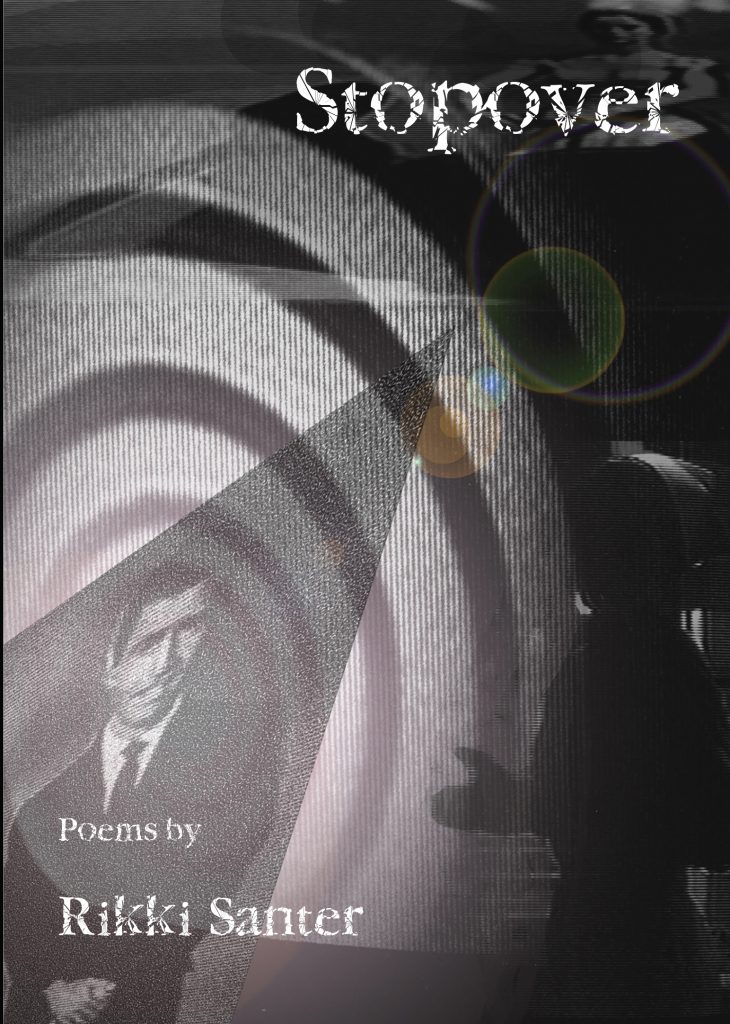
In her new Twlight Zone-inspired collection, Stopover, Rikki Santer meets Rod Serling in “the dimension of imagination” and the consummation that results is pure literary gold.—John Burroughs, Ohio Beat Poet Laureate and author of Rattle an Numb
Rikki Santer’s work is known for making words dance together that have never danced before as evidenced once again in this new collection. Stopover doesn’t require a reader to be familiar with Rod Serling’s The Twilight Zone, but reading it you’ll experience the delightful disorientation the classic TV program delivered. With references to Talking Heads, stand-up comedy, and Emily Dickinson, these poems take apart the familiar world and then, in bursts of insightful juxtaposition and acrobatic language, refuse “to reassemble atoms for the way / we want them to be.” Each poem is an episode of re-creating the fundamentals of perception.—Steve Abbott, author of A Language the Image Speaks
Many years ago, when I first traveled through Yellow Springs, Ohio, the home of Antioch College, I felt a strange Twilight-Zone presence in that Sunday-morning vacant town. The inn’s proprietor was not surprised because “upstairs Rod Serling taught class.” I felt the vibe. Now, I’m catching that vibe again with Rikki Santer’s Stopover, her poetic riffs on Sterling’s Twilight Zone, which takes the series to another dimension, where the allegories are soft reminders of our humanity, our vulnerability, and our innocence. Our enjoyment is seeing episodes with “no moral, no message, no prophetic tract/just a suit of armor held together by one bolt/call it faith.” She soars, for instance, when she shares the bird’s-eye view of Mickey Rooney as a washed-up jockey, condensing the aging loser in a prison-like room with “walls closing in as your consonants rattled, your character out of his mind with shortness, neon gel of your ranting, nighty night.” Rikki and Rod parse the lonely life of a has-been: Rod’s washed-up jockey and Rooney’s seedy actor with “frayed pockets: king high, ace low.” In her Cento poem, she uses Serling’s voice in a fantastic world full of question marks and leavened by the possibility but never the reality of bromides. Rikki Santer’s poetic appreciation of The Twilight Zone series embraces for our consideration cynicism about our intentions and unconditional love for our imperfection. Enter her lyrical zone to enjoy Serling’s simple tales as the stuff of poetry. If you think humankind to be masterfully in charge, then Rikki and Rod will remind you that we are doomed to be served on a platter by those who know we deserve it. —John DeSando, producer and host of It’sMovie Time and Cinema Classics as well as podcasts Back Talk and Double Take for NPR’s WCBE 90.5 FM, Columbus, Ohio.
Fifty years ago, Rod Serling appeared as a stylistic voice of a mundane angel, “…offering for our consideration…” melodramas with undertones of Kierkegaard and Socrates. Thematically “The Twilight Zone was a freakish variety of episodes dwelling between irony, despair, and commercial sponsors delivered one evening a week. The peripatetic poet Rikki Santer provides a similar episodic world that like the form of the Sixties television show, frames a just beyond the narrator’s voice. For those of us who were fans of the program, an allusion to Rod Serling, monochromatic, nearly monotonal signaled the immanent appearance of absurdity; we all heard him introducing some moment of our private chaos. Santer’s poems in Stopover allude to that conscious landscape that grows irony and paradox. She employs a variety of poetic forms employing a Modernist lens with Post Modern appropriations: Ghazals, refractions of pop songs, Cinquains, Centos, How To articles and imaginary auditions. Readers find her celebrating an aspect of poetic humanity within a philosophical appreciation like Serling’s characters, simultaneously oblivious and acutely engaged with the contextual minutiae of awareness. In the twilit world of these poems overlooked witnesses testify. Emily Dickinson appears, along with Boone’s Farm wine, Carol Burnett, badly costumed Martians, antisemitic suburban parents, Buster Keaton and even a crossword elegy for Eddie Van Halen. Like the pernicious guile of Rod Serling, these aren’t poems to pass an evening, but rather strange songs that sting and undercut the notions of nostalgia and societal innocence. This is the cold eye of the passing horseman. Readers should not mistake her enthusiastic language for a showy gush of technique; these dimmed down epiphanies are more like the breaths of air of a woman struggling not to drown. Rikki Santer is the mistress of misdirection, forcing the reader to look where they only believe they are choosing to look—but instead exactly where she desires their vision to be.—D E Zuccone, author of Vanishes
ISBN 978-1-952411-74-8
Copies available through the publisher, Luchador Press, via Barnes & Noble and Amazon Books or by contacting me through my website.